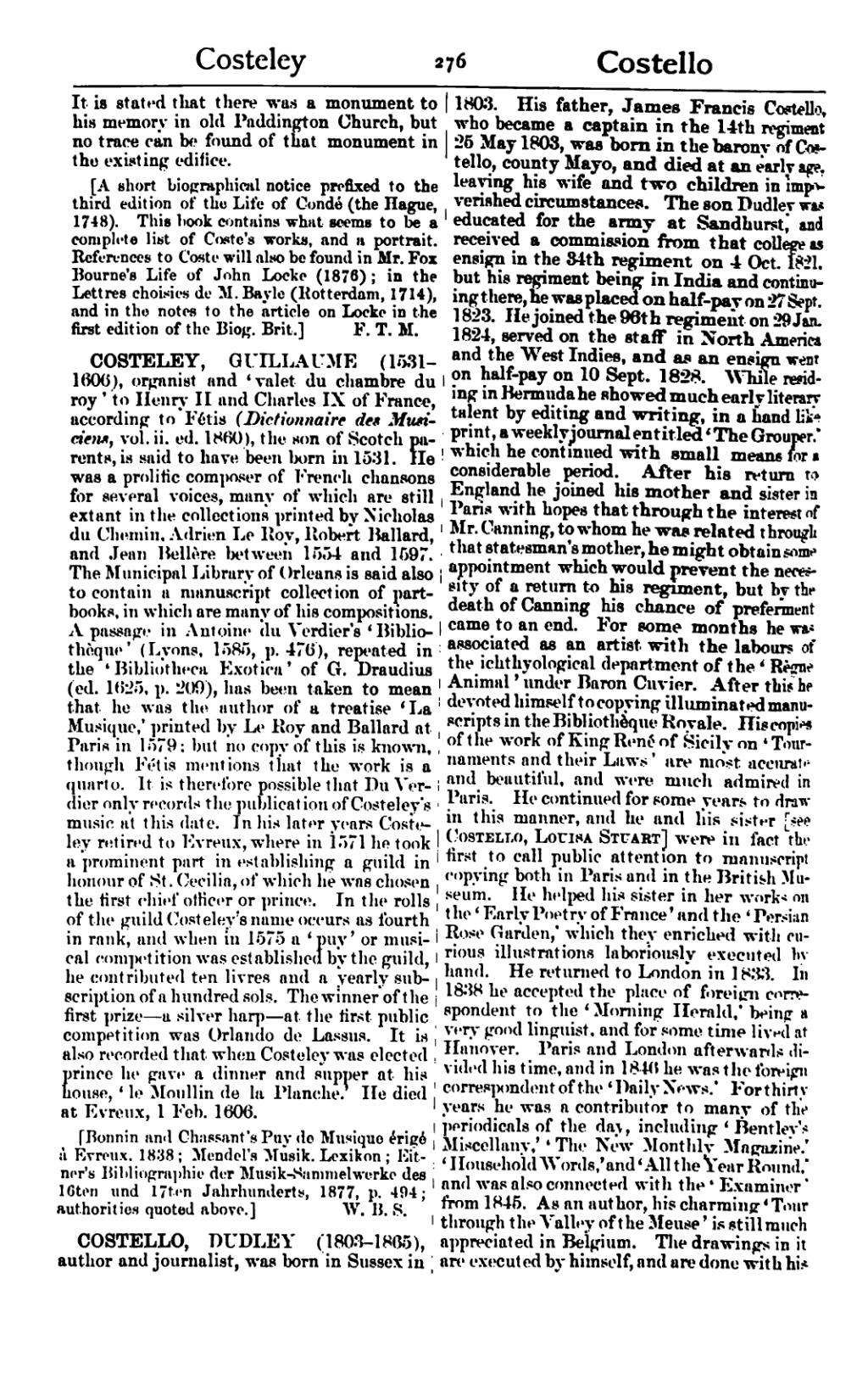It is stated that there was a monument to his memory in old Paddington Church, but no trace can be found of that monument in the existing edifice.
[A short biographical notice prefixed to the third edition of the Life of Condé (the Hague, 1748). This book contains what seems to be a complete list of Coste's works, and a portrait. References to Coste will also be found in Mr. Fox Bourne's Life of John Locke (1876); in the Lettres choisies de M. Bayle (Rotterdam, 1714), and in the notes to the article on Locke in the first edition of the Biog. Brit.]
COSTELEY, GUILLAUME (1531–1606), organist and ‘valet du chambre du roy’ to Henry II and Charles IX of France, according to Fétis (Dictionnaire des Musiciens, vol. ii. ed. 1860), the son of Scotch parents, is said to have been born in 1531. He was a prolific composer of French chansons for several voices, many of which are still extant in the collections printed by Nicholas du Chemin, Adrien Le Roy, Robert Ballard, and Jean Bellère between 1554 and 1597. The Municipal Library of Orleans is said also to contain a manuscript collection of part-books, in which are many of his compositions. A passage in Antoine du Verdier's ‘Bibliothèque’ (Lyons, 1585, p. 476), repeated in the ‘Bibliotheca Exotica’ of G. Draudius (ed. 1625, p. 209), has been taken to mean that he was the author of a treatise ‘La Musique,’ printed by Le Roy and Ballard at Paris in 1579; but no copy of this is known, though Fétis mentions that the work is a quarto. It is therefore possible that Du Verdier only records the publication of Costeley's music at this date. In his later years Costeley retired to Evreux, where in 1571 he took a prominent part in establishing a guild in honour of St. Cecilia, of which he was chosen the first chief officer or prince. In the rolls of the guild Costeley's name occurs as fourth in rank, and when in 1575 a ‘puy’ or musical competition was established by the guild, he contributed ten livres and a yearly subscription of a hundred sols. The winner of the first prize—a silver harp—at the first public competition was Orlando de Lassus. It is also recorded that when Costeley was elected prince he gave a dinner and supper at his house, ‘le Moullin de la Planche.’ He died at Evreux, 1 Feb. 1606.
[Bonnin and Chassant's Puy de Musique érigé à Evreux, 1838; Mendel's Musik. Lexikon; Eitner's Bibliographie der Musik-Sammelwerke des 16ten und 17ten Jahrhunderts, 1877, p. 494; authorities quoted above.]
COSTELLO, DUDLEY (1803–1865), author and journalist, was born in Sussex in 1803. His father, James Francis Costello, who became a captain in the 14th regiment 25 May 1803, was born in the barony of Costello, county Mayo, and died at an early age, leaving his wife and two children in impoverished circumstances. The son Dudley was educated for the army at Sandhurst, and received a commission from that college as ensign in the 34th regiment on 4 Oct. 1821, but his regiment being in India and continuing there, he was placed on half-pay on 27 Sept. 1823. He joined the 96th regiment on 29 Jan. 1824, served on the staff in North America and the West Indies, and as an ensign went on half-pay on 10 Sept. 1828. While residing in Bermuda he showed much early literary talent by editing and writing, in a hand like print, a weekly journal entitled ‘The Grouper,’ which he continued with small means for a considerable period. After his return to England he joined his mother and sister in Paris with hopes that through the interest of Mr. Canning, to whom he was related through that statesman's mother, he might obtain some appointment which would prevent the necessity of a return to his regiment, but by the death of Canning his chance of preferment came to an end. For some months he was associated as an artist with the labours of the ichthyological department of the ‘Règne Animal’ under Baron Cuvier. After this he devoted himself to copying illuminated manuscripts in the Bibliothèque Royale. His copies of the work of King René of Sicily on ‘Tournaments and their Laws’ are most accurate and beautiful, and were much admired in Paris. He continued for some years to draw in this manner, and he and his sister [see Costello, Louise Stuart] were in fact the first to call public attention to manuscript copying both in Paris and in the British Museum. He helped his sister in her works on the ‘Early Poetry of France’ and the ‘Persian Rose Garden,’ which they enriched with curious illustrations laboriously executed by hand. He returned to London in 1833. In 1838 he accepted the place of foreign correspondent to the ‘Morning Herald,’ being a very good linguist, and for some time lived at Hanover. Paris and London afterwards divided his time, and in 1846 he was the foreign correspondent of the ‘Daily News.’ For thirty years he was a contributor to many of the periodicals of the day, including ‘Bentley's Miscellany,’ ‘The New Monthly Magazine,’ ‘Household Words,’ and ‘All the Year Round,’ and was also connected with the ‘Examiner’ from 1845. As an author, his charming ‘Tour through the Valley of the Meuse’ is still much appreciated in Belgium. The drawings in it are executed by himself, and are done with his
